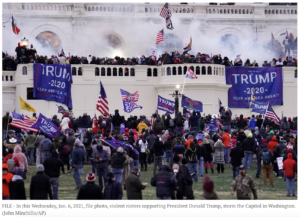
In his farewell address to Congress, Rep. Adam Kinzinger chastised his Republican colleagues for justifying the Jan. 6 attack on the Capitol as “legitimate political discourse.” As the Jan. 6 Committee report made clear, while the message of Trump supporters might be protected political speech, the medium used by the insurrectionists — violent attacks on people and property — stripped the message of its constitutional shield.
Trump Republicans can shout all they want that the 2020 election was stolen; they can hold rallies; they can threaten political retaliation; they can censure members of their own party who dissent from the majority view; they can glorify the participants in the Jan. 6 protests as patriots. All of it is protected speech. However, the breach of the Capitol walls, the defiling of its contents, the assaults on its guardians were not constitutionally protected acts; they were criminal acts.
The insurrectionists used violence as the medium to communicate their message. Characterizing the insurrectionists’ actions as legitimate political discourse wrongfully conflates the medium with the message, implying that because the message is constitutionally protected, so are the means of communicating it.
The Trump supporters who attended the Jan. 6 rallies were angry; they had a lot to say and every right to say it. Their protests amounted to political speech critical of the election process and the role of Congress in certifying the election. In fact, political discourse is awarded the strongest protections offered by the First Amendment. Political speech has been enjoying all the full firepower of the First Amendment since the middle of the last century. The right to argue, criticize, and debate is essential to a strong democracy.
Political speech is not merely communication transmitted during campaigns or among politicians, legislators, lobbyists, and activists. Any person or even corporation expressing an opinion or engaging in debate on a matter of public concern, whether that be matters of policy, morality, economics, or the like, is engaging in political speech. Political speech is not always pleasant or courteous or comforting. It is often caustic, troublesome, or based on false ideas but tenor cannot…Read More
Lynn Greenky. is a Professor Emeritus at Syracuse University, where she taught a beloved undergraduate course about the First Amendment for 10 years. She continues to write and speak about the First Amendment and is the author of When Freedom Speaks.
